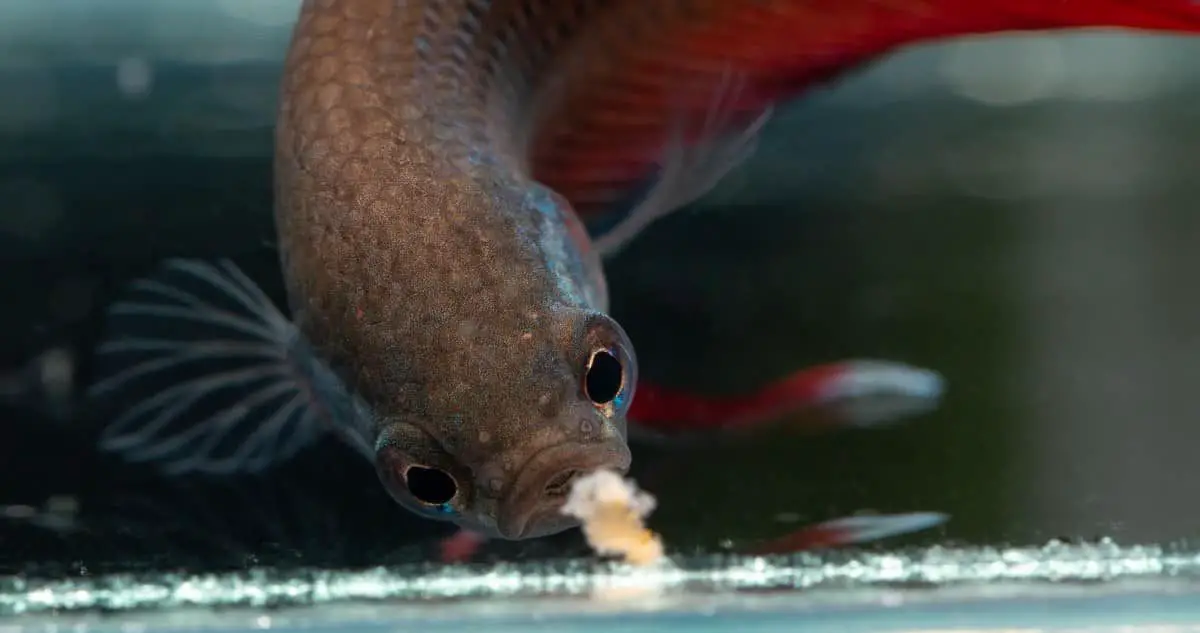Affiliate Disclosure: This post may contain affiliate links. If you make a purchase after clicking on these links I will be compensated at no extra cost to you. However, I never recommend anything I don’t love or wouldn’t use myself!
When feeding my betta fish I often wonder if they actually know when to stop eating. Many people claim betta fish will eat themselves to death if given the opportunity. I decided to do some research and here’s what I found.
So, do betta fish know when to stop eating? Betta fish have stretch receptors around their stomach which signal to the brain when the stomach is full. However, overfeeding can still lead to constipation and bloating which can be life-threatening if ignored. Even worse, excessive food in the tank creates toxins in the water which is actually the most common cause of death from overfeeding.
Later in this article, I will outline some good feeding practices to prevent digestive issues and to maintain water quality.
First though, what action should you take if you’ve put too much food in your betta’s tank or if your betta has developed constipation?
I Put Too Much Food In My Bettas Tank! What now?
Whether you’ve had a food spillage inside your tank or your kids have been a little overzealous while feeding your betta, accidents will happen. So what should you do next?
First of all, it’s not a good idea to leave any excess food in the tank. You should do your best to remove any uneaten food as soon as possible.
Depending on how much food made its way into the tank, you may also have to carry out a water change and gravel vacuum to minimize any ammonia spikes.
If you believe your fish has eaten rather more than their recommended allowance, it’s best to hold off on the next couple of feeds or more depending upon how bad the situation is.
Monitor your fish closely for the next few days to ensure they’ve not developed constipation. Some signs of constipation include a bloated stomach, loss of appetite or a lack of defecation.
It is also quite common for a betta fish with constipation to develop a swim bladder disorder.
Swim Bladder Disorder Due To Constipation In Bettas
Swim bladder disorder in bettas is most commonly caused by constipation. However, it’s important to note that there can be other causes which may need to be treated differently.
You can tell if your betta has a swim bladder disorder as they may look a little off balance and struggle to stay upright. They will also tend to float near the water’s surface or be stuck down at the bottom of the tank.
Being labyrinth fish, bettas need to access to the water’s surface in order to absorb oxygen from the air. This is how bettas are able to survive with low oxygen levels.
Be aware that if your betta is stuck at the bottom of the tank, they will not be able to reach the water’s surface easily and they may struggle to breathe.
This is particularly an issue if you do not have any aeration in your tank and the water oxygen level is low.
If this is the case for your betta you may want to consider lowering the water level or temporarily moving your betta into a smaller receptacle of some kind. This way they can reach the surface for air more easily should they need it.
In a smaller container with no substrate in the way, you will also be able to keep an eye on their bowel movements, so you will know when they are on their way to recovery.
Adding a few plants to the container will also help improve oxygen levels and make your betta feel less conspicuous and stressed.
If your betta is bloated and/or has a swim bladder disorder due to constipation, the general idea is to treat their constipation first.
Bloat and swim bladder disorder symptoms should subside once constipation has been cured.
Treating Betta Constipation/Bloat/Swim Bladder Disorder
Curing constipation in bettas may take some time but it is usually quite simple. The most important thing is to stop feeding them until they begin to make a recovery.
After around 3 days without any food, you can try feeding your betta some daphnia. Daphnia acts like a natural laxative and is great for clearing their bowels.
Alternatively, if your betta does not like daphnia, you can feed them around 1/4 of a deshelled pea. Peas are rich in fiber and will also help to clear their digestive system.
To prepare a pea, first of all, boil the pea as you would normally. Once the pea is cooked and has cooled down, you must fully remove the skin.
Bettas cannot digest pea skins and can end up in a much worse situation if you do not remove all of it.
chop about 1/4 of the cooked, deshelled pea into small manageable mouthfuls and feed it to your betta.
You can keep repeating this process every few days until your betta has made a full recovery.
If you still see no improvement after about a week-10 days, you can try giving your betta an Epson salt bath.
Many people use Epson salt baths as soon as there is any sign of a swim bladder disorder. Personally, I would only use this as a last resort as there is a chance your betta could go into shock.
How Much Should You Feed A Betta Fish And How Often?
First of all, it’s worth bearing in mind that a betta’s stomach is only marginally larger than the size of its eyeball, so you should only really feed your betta fish around this quantity per sitting.
2 feeds per day, once in the morning and once in the evening of around an eyeball’s capacity is a good general rule to go by.
Fewer larger feeds can be a little taxing on a bettas tiny digestive system and will usually result in food going uneaten.
If uneaten food is not promptly removed from the tank it will foul the water far quicker than usual and may create a dangerous environment for your fish.
Remember, it’s always better to underfeed as opposed to overfeed a betta.
It takes a lot for a betta to starve to death, as they can last a very long time without any food. Overfeeding, on the other hand, is one of the most common causes of betta death.
Many people recommend fasting betta fish once a week in order to help prevent digestion problems.
The Best Types Of Food For A Betta Fish
Betta fish are carnivorous, so they are used to high protein diets. In the wild, they would generally eat things such as worms, blood worms, mosquito larvae, brine shrimp, daphnia and sometimes even other smaller fish.
Fish pellets specially formulated for bettas contain a good variety of nutrients which your betta needs to be healthy and are designed to be a good size for bettas to consume.
However, pellets can be a little dry which can also cause your betta to be constipated as they can swell up inside their stomach.
It’s best practice to soak betta pellets in water for 5-10 minutes prior to feeding in order to combat this.
While pellets can make up a large portion of your betta’s diet, it’s a good idea to try to mix things up a bit and mimic what they would normally eat in their natural habitat.
Replacing their normal feed with a variety of foods such as mosquito larvae, brine shrimp, blood worms, wingless fruit flies, Mysis shrimp or daphnia at least 2-3 times a week will help improve their digestive health.
Like many other pets, you will find that each betta fish has it’s own preferences in brands or types of food so you may have to do a little experimentation as to which foods are most suited to your betta.
Related Questions
How long can a betta fish survive without any food? Although it is not to be encouraged, betta fish can actually survive up to 2 weeks without any food. This is one of the reasons it’s far better to underfeed than overfeed a betta fish.
Why does my betta spit out its food? It’s believed that betta fish suck and spit their food out as a mechanism to help soften or break it down before ingesting it. It is a common behavior in many fish and is nothing to worry about.

